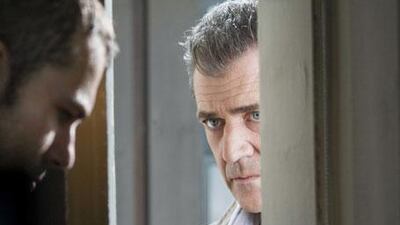A story of an honest cop whose only daughter is gunned down in a government-linked conspiracy: it is difficult to picture anyone other than Mel Gibson playing the lead role in Edge of Darkness. But no matter how well-suited his appearance feels, few would have predicted his first acting job in five years would be the remake of a British 1980s television thriller.
Directed by the Casino Royale filmmaker Martin Campbell, who also handled the BBC's (5½ hours long) original Edge of Darkness in 1985, it sees a noticeably older Gibson returning to the screen after a decade in which he became as renowned for his personal problems as for his work in film. After the agonising violence of the movie's opening 10 minutes, in which Emma Craven (Bojana Novakovic) a "glorified intern" at a nuclear testing facility, is shot dead in her father's arms, Gibson's character becomes The Guy With Nothing To Lose.
It's familiar territory for the actor - close to the damaged-revenge-hungry-killer-with-a-heart-in-the-right-place that we know from the Mad Max and Lethal Weapon films. But here Gibson seems even more wounded and victimised than ever before. Perhaps his public press savagings in recent years helped him create the sense of detachment and isolation that this character exudes. Set in Boston, the film's plot is standard stuff. It sees Gibson's Thomas Craven following a trail of clues and attempting to unravel the mystery of Emma's killing. He confronts her friends, her employer, all manner of hired thugs and even a senator.
Almost without exception, the increasingly unstable Craven physically assaults and threatens to murder those whom he believes to be involved. In a role that feels substantially curtailed for this adaptation, Ray Winstone plays Jedburgh, a grumbling, morally ambiguous agent of some kind, with information about the murder. Despite having relatively little screen time, the scenes he shares with Gibson are some of the film's most memorable and dramatic.
As Craven shoots, punches and threatens his way to the truth, he learns that his daughter's employer was becoming a threat to US national security and that she had attempted to blow the whistle. Because of the company's political connections, however, Craven realises that his daughter's killers will never be brought to justice by conventional means. Despite nuclear themes that feel conspicuously anchored in the 1980s, the story has enough exciting twists and turns to remain interesting.
Gibson's performance as a man teetering on the brink of a nervous breakdown feels like a return to form and the appearances of Winstone and Danny Huston (as the stunningly inhumane corporate villain) are both excellent. But despite all the pieces apparently falling correctly into place, you get the feeling that Edge of Darkness doesn't amount to very much. Campbell never really sets a foot wrong in creating the tense thriller, but his direction is strangely workmanlike for a filmmaker who's been given a second run at this story. There's also nothing in Edge of Darkness that we haven't seen a dozen times before.
But despite being predictable and slightly short on new ideas, the film holds its own as a conspiracy thriller, thanks to an unhinged central performance that seems to be steeped in Gibson's own personal anguish.

